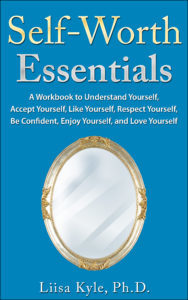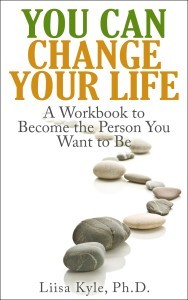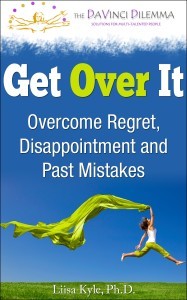Liisa Kyle's Blog, page 10
February 3, 2018
Put Yourself First – Yes, Really
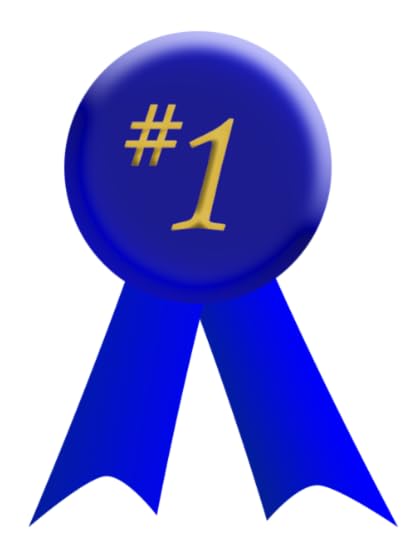
image via commons.wikimedia.org
Do you put yourself first? If you’re like most multi-talented people (a.k.a. DaVinicis), you don’t. You run around, juggling too many projects and random life demands. You often feel over busy or stressed — maybe even frantic — yet it doesn’t feel like much is getting done. Your life balance is out of whack. (You can verify this using our self-assessment). Step One on the road to balance is to put yourself first. There’s a reason why airlines instruct us to “put your own oxygen mask on first before assisting others with theirs.” You can’t help anyone else if you’ve passed out from lack of air. By the same token, you can’t tend to all the people, projects and ideas on your plate until you first attend to your own needs.
Let’s try an experiment: What if I told you to stop what you’re doing RIGHT NOW and put yourself first. What would be your reaction? Relief (Gosh, you mean I can?) — Incredulity (You must be joking! I can’t possibly!) — Anger (How dare you even suggest it?) — Frustration (I’d really like to but there’s no way I can) — Fear (If I do, everything might fall apart!) — Guilt (That would be selfish) — or something else?
Why do you think you responded that way? Whose voice(s) do you hear in your head? What unhelpful beliefs are interfering with putting yourself first? Take a few moments and write them down. For example, “If I don’t work myself to the bone and struggle with ever fiber of my being, I won’t earn my success.” “Nice people put others first.” “A good parent/spouse/colleague puts themselves last.” “I don’t have time to read/exercise/meditate.” “There aren’t enough hours in the day to attend to all aspects of my life properly.”
Once you’ve identified the nature of the unhelpful beliefs interfering with your life balance, you can address them. For each, look for evidence to the contrary. “Well, come to think of it, there is no law that one must struggle to succeed. I tend to do much better when I’m enjoying what I do, actually. And when I look around at my friends who are doing well — and even my role models — they’re not stressed out, pushing. They’re not being martyrs. In fact I think my martyrdom has hurt some relationships, if I were truthful.”
Now: ask yourself what are the costs of NOT putting yourself first. Your first clue is probably in how you reacted to my first question — anger, resentment, fear, negativity, pessimism. It ain’t pretty. Have you ever experienced a lopsided relationship (personal or professional) — or muted your ideas or creativity unnecessarily — or otherwise played the Doormat Role? I’m sure your intentions have been noble. You’re probably a People Pleaser. It’s one thing to be kind, respectful and helpful…it’s quite another when you allow others to take advantage of you…or get swept away in their plans, losing sight of your own.
So how to start operating differently? How can you put yourself first?
1. Make a conscious decision to honor your own needs.
What’s important to you? What makes you happy? Fulfilled? Write them down. Remind yourself of these priorities every day. (It may seem silly but without deliberate daily reminders, we quickly slip back into old habits).
2. Give yourself time.
How much ‘YOU’ time do you have each day? Each week? How can you give yourself more time? (You can do a detailed time analysis using this technique).
3. Nourish your ideas.
Your ideas are your greatest asset. Tend them with care. Be their advocate: Support them and protect them from being trampled unnecessarily.
4. Develop your voice.
As a multi-talented person, your reason for being is to create in many media. Finding and cultivating your own unique voice — in each of your talents — allows your creativity to take flight.
5. Listen to your body.
Your body always knows what you need. It detects when you’re hungry or thirsty or sleepy or in danger. Being attentive to our biological needs is a fundamental part of putting yourself first. If you’re feeling stressed or achy or fatigued, take a break. Ask your body what you need: it might be a walk in nature or a nap or an apple…or a week in Fiji.
As well, your body can cut through the confusion of too many ideas, too many projects and too many talents. Our brains can hijack our actions and attention in a million directions, built on a thousand random rationales. But a ‘gut feeling’ is infallible. If you listen to your gut, it will reveal which is the best idea, which path is crazy making and which is a delight, which person is dangerous or draining and which is a kindred spirit. If you find yourself overthinking things, try listening to your gut instinct.
6. Treat yourself well.
How do you treat your friends and loved ones? Do you speak to them kindly? Do you support their endeavors? Do you buy them gifts or do special things for them or take them interesting places? NOW: how do you treat yourself? How do you talk to yourself? What’s your tone like? Do you call yourself names or berate yourself needlessly? Do you support or sabotage your creative efforts? Do you get yourself the support you need? Do you take good care of yourself — physically, psychologically and/or spiritually? Do you buy yourself presents or do special things for yourself or take yourself interesting places? Why not?
7. Reward yourself.
When you accomplish something, do you do anything to acknowledge it…or do you plow right onto the next thing? By rewarding yourself for the things you do, you’ll be happier and so much more productive.
*****
Activity: Clear at least 30 uninterrupted minutes. Use this article as a mini-coaching session: go through all the questions and write down your answers. Be as candid as possible. What patterns do you notice? What actions can you take, going forward, to put yourself first?
*****
For more, check out my workbook: SELF-WORTH ESSENTIALS: A Workbook to Understand Yourself, Accept Yourself, Like Yourself, Respect Yourself, Be Confident, Enjoy Yourself, and Love Yourself.
Available here: http://bit.ly/SelfWorthEssentials
*****
If you’d like to share or publish this article, you may, if you include the author’s name, a link to this original post and the following text blurb:
Are you struggling with too many talents, skills, ideas? You may have The DaVinci Dilemma™! Find tools, fun quizzes, coaching, inspiration and solutions for multi-talented people at http://www.davincidilemma.com/.

January 4, 2018
Defining Your Year

image via commons.wikimedia.org
You are a busy person juggling many projects, ideas, and talents. You’ve got a lot going on. If you could choose, what kind of year would you like 2018 to be?
It’s up to you. If you wish, you can orchestrate the upcoming year around whatever is important to you at this point in your life.
What is your number one priority? What kind of tone would you like to set for the New Year? If you gave 2018 a theme, what would it be?
Susan’s number one priority in 2018 is to have fun. Keith would like to focus on his health. Maria is calling 2018 her “Year of Relaxation” while Clive is looking forward a “Year of Positivity”. Sandra would like to devote the year to getting organized in every area of her life. Marta is alarmed by recent events and would like to dedicate the next twelve months to “Action”.
What kind of year would you like 2018 to be? What would you love to do this year?
***
Activity: Take a few moments to identify your top priority or theme for the next twelve months. Define it in a word or phrase.
***
Once you’ve identified the overall theme for your year, take some time to think about what that means to you.
***
Activity: Write your top priority or theme on a blank page. Doodle around it. Jot down words or phrases that pop into your head when you think about your theme. Sketch or draw. If you wish, go through magazines and clip out images or words to glue onto the page.
***
Next take a few more minutes to contemplate how you could implement your theme in different areas of your life.
***
Activity: Clear ten uninterrupted minutes to brainstorm answers to the following questions:
When you think about your top priority for 2018, what kinds of activities or events would constitute a great year for you?
When you think about your top priority for 2018, who would you like to be a part of your year? Who would you like to spend time with? With whom would you like to have less contact?
As you think about your top priority for 2018, what would you like to do, experience, learn, acquire, or accomplish in your personal life?
As you think about your top priority for 2018, what would you like to do, experience, learn, acquire, or accomplish in your work life?
After you conclude your brainstorm, review your answers. Circle the one to five items that are most important and most appealing to you.
Rewrite this list of top ideas and put it somewhere you will see it every day (e.g. on your computer, in your phone, on a Post-It by your toothbrush).
***
If you’d like more ideas about Making the Most of 2018, check out my book: http://bit.ly/MakeTheMostof2018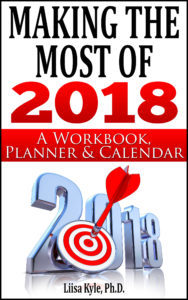

December 1, 2017
Make the Most of 2018

Available here: http://bit.ly/MakeTheMostOf2018
What would you like to do with 2018?
Some people like to set specific goals for the New Year. Others prefer to give some general attention to a particular area of their life. Keith’s priority in 2018 is to focus on his health. Maria’s is to relax. Maybe you’d like to travel. Or learn. Or create. Or do good deeds. Perhaps you’d like this to be the “Year of Fun”. Maybe you’ve been overly career driven and this is the year you’ve like to give more attention to your home life.
It’s entirely up to you: What would you like to experience this year? What’s important to you? What would you like to explore or learn? What would you like to accomplish, acquire, or complete?
The beginning of a New Year is a terrific time to pause and ask yourself these questions. New Year’s Eve is more than just a festive excuse to party…it’s a chance for a fresh start. Kinda like pressing a personal “re-start button.” If you choose to do so, you can use the opportunity to look back at the preceding year and take stock of your present circumstances. You can identify what’s working well for you and what’s not. You can make thoughtful, purposeful decisions about how to live the next twelve months. With a little forethought, New Year’s Eve can be a pivot point to do more of what you love and less of what you don’t.
If this sounds appealing, I’ve developed a workbook to guide you through a process to make the most of the coming year. It’s completely up to you: What would you like to do, experience, explore, learn, accomplish, acquire, or complete in 2018?
Note the emphasis on you. You. Not what your Mom or your boss or your childhood chum might want. What kind of year would you like 2018 to be? What matters to you at this point in your life?
What would it mean to you if you made the most of 2018?
Whatever your desires for 2018, I can help. I’m an author, life coach, and Ph.D. in Psychology who has spent the past twenty years helping people get things done, get organized, and get more out of life. I’ve coached individuals, facilitated groups, and taught inventive workshops on four continents.
I’ve designed this book so you can get the most out of 2018. Think of it as a personal seminar with a recognized expert, tailored to your unique circumstances and preferences. Inside this workbook are proven tools you can work through at your own pace to foster whatever is important to you.
That’s what makes this book special. It’s a flexible guide that will elicit different responses in everyone who uses it. It’s up to you to apply your distinctive perspective to create and implement a plan suitable to your particular circumstances.
It’s actually two books in one.
It begins with a Self-Guided Workshop you can work through at your own pace to:
understand and appreciate 2017
generate ideas for all areas of your life
identify your true top priorities for 2018
make achievable plans for 2018
The remainder of this book is designed to keep you on track throughout the year. You’ll have the opportunity to customize the Planner/Calendar to:
implement your plans for 2018
monitor your progress
make adjustments as needed
A Word About “Resolutions”
The way most people do traditional “New Year’s Resolutions” is not very effective. They tend to be overblown “To Do” lists that become a source of unnecessary frustration. They can be overwhelming or intimidating. They often become abandoned which can cause guilt, shame, and a sense of failure.
The alternative is to create a prudent plan that can be reasonably implemented, given your specific circumstances. That’s the purpose of this workbook.
If you’ve been disappointed by past attempts at “New Year’s Resolutions”, let me reassure you. As a life coach, I’ve developed proven techniques for you to figure out what you want and then devise achievable plans to make that happen.
Maybe you’d like to set some specific goals. Perhaps you’d like to solve a problem. Or participate in some key activities to enhance your life. Or establish new habits or practices that are uniquely gratifying to you. It could be that you have an unfulfilled dream or an unfinished project on which you are yearning to make some progress. Maybe you’d like to reduce or eliminate an unhelpful or unhealthy habit.
It’s up to you. Using this workbook as a guide, you have the opportunity to figure out what’s right for you, right now, to make the most of 2018 — then devise achievable plans suitable to your particular circumstances. The Planner/Calendar is designed to help you actually do what you intend.
Give yourself — or someone else — the give of a wonderful 2018. Paperback available here: http://bit.ly/MakeTheMostof2018

November 8, 2017
Joni Mitchell: The Definintive DaVinci

image via commons.wikimedia.org
Painter, musician, singer, composer, lyricist – even children’s book author, Joni Mitchell is the definitive DaVinci. Today she turns 74! Join us in wishing her the happiest of birthdays.
As much as she is heralded for her musical talents, she sees herself differently:
“I’m a painter first, and a musician second…” September 8, 1998
“I have always thought of myself as a painter derailed by circumstance.” June 2000
Learn more about Joni Mitchell here.
For a fascinating biography of this definitive DaVinci, check out Sheila Weller’s masterwork Girls Like Us: Carole King, Joni Mitchell, Carly Simon–And the Journey of a Generation.

October 6, 2017
Feel Blue or Blah? How to Beat The Blues

image via commons.wikimedia.org
Multi-talented people experience an astonishing range and depth of emotion. DaVincis can feel dizzyingly delighted, outrageously excited, stupendously angry and jaw-droppingly passionate. Sometimes at the same time. Alas our mood can also sink down. What might start as an “off” day that takes a dismal downward spiral through a muttering funk before ending up plunk in The Blues. Sometimes we encounter something relatively trivial and respond disproportionately – taking to our beds where we sob our way through half a box of tissues. (Note: I’m not talking about clinical depression – if you suspect you’re medically depressed, please get professional help immediately. If you don’t know where to go, ask your MD or start here.) I’m talking about feeling blue or feeling blah – that sad mood, that angsty, self-pitying pool of negative thoughts and emotions that can eat energy and devour days like kudzu decimating cropland. It can make you an unwilling Debbie Downer, afflicting everyone with whom you interact.
As anyone who’s ever felt The Blues can attest, there is a natural, knee-jerk reaction when this occurs: panic. “Oh no! I’m going down! Man the alarms! This ship is sinking!”
Stop. Breathe. It’s natural for us to go up and down. We’re creative people. We feel everything pretty acutely.
Remember: Everyone has an off day, from time to time.
If it feels more serious than that — if your mood has been plummeting for days — heading south of your knees with no relief in sight — it’s time to take some action.
Here are 30 proven ways to Beat the Blues:
Get outside. You need natural daylight and you need it stat. The Blues dissipates in daylight.
Move your body – walk, dance, do yoga or tai chi. Anything! Any kind of physical activity can elevate your mood.
Fast as you can, write a list of 50 things for which you’re grateful. Research in Positive Psychology has shown how gratitude makes us happier.
Call your most positive friend(s) for a chat. Ask them about what’s happening in their life. Allow yourself to get swept up in their joy.
Go to your music collection. Select and play songs that make you happy – or that represent a joyful time in your life. Sing along. Dance!
Watch or read some comedy. On TV, in a film or book — ideally in a comedy club.
Lay off the booze. If you simply refrain from drinking for a few weeks, your mood will rise. Alcohol is a depressant and those nightly nightcaps can take a huge toll on creative minds and spirits.
Eat a small amount of good quality chocolate – the highest percentage of cocoa that you can handle. Real chocolate (not the junk version stuffed with fat and sugar) is a natural neurochemical mood lifter.
Lay off the news. Whether on TV or the internet, the news is bound to depress you. Take an ‘information vacation’. Don’t worry. If anything really important happens in the world, you’ll hear about it.
Take a day off. Rest. Replenish. Refresh.
Pamper yourself (in a healthy, positive way).
Play a game – a board game, a card game – something fun and engaging. It’s hard to feel blah when you’re having fun. (Note: avoid any activities you find addictive).
Treat yourself to a play date – alone (if you spend most of your time with people) or with someone (if you spend a lot of time alone). Do something fun – purely for the pleasure of it.
Volunteer – give your time or money to a good cause. Again, research has shown that volunteering is a terrific way to beat The Blues.
Press the reset button. Decide to be happier. Declare today ‘happier’ day and act that way.
Identify one thing in your life you adore. Meditate on it.
Smile. Hold you face in a smile for at least 30 seconds. Repeat once an hour. Research shows that holding your face in the ‘smiling’ position, actually makes you *feel* happier.
Think of a time and place you were really happy. Set a timer for (at least) ten minutes. Close your eyes and imagine you’re in that lovely time and place. When other thoughts intervene, push them gently aside and resume imagining. Focus on the details. See if you can recreate those happy feelings, here and now.
Commit three random acts of kindness. It’s hard to feel blah when you’re bringing joy to others.
What’s the funniest film you’ve ever seen? Watch it again.
Invite a positive person for a walk or tea or meal. Get out of your headspace and into theirs.
Help someone else. Think of someone who could use your support right now. Offer it. Research shows that helping others provides profound, persistent joy.
Spend time in nature.
Focus on the now, on this particular moment.
Try any of these meditations. As they were designed (and proven) to help even those who are clinically depressed, imagine what they’ll do if you’re just feeling a bit blah or blue?
Put a thick elastic band around your wrist. Snap yourself whenever you utter or think something negative. It sounds trite but you can actually train yourself to refrain from negative thoughts – which goes a long way to improving your mood.
Avoid contact with anyone and anything that is negative. Unsure? What does your gut say? If your gut contracts when you think of a certain person, consider minimizing contact with them. If your shoulders cave in thinking about a particular task or idea, it’s negative. Avoid it.
Do something new. Go to a new place or try a new food. Novel experiences bust the blues and make life much less blah.
Often, a lot is going well except for the few things that hijack our psyches with some kind of dreadful doom. To the extent possible, take objective stock of your situation. What’s going well? What’s not? What 20% of your life are causing 80% of the problems? Eliminate them. Solve them. Do everything you can to focus on the 80% of your life that’s going tickety-boo.
What’s the most important thing in your life – the thing you love most? How much attention are you giving it? Give it more. It’s amazing how many writers haven’t written in a month…and then wonder why they’re feeling blue or blah. You know what your talents are – do them!
*****
Activity: what helps raise your spirits when you’re feeling The Blues? Which of the above 30 techniques have you tried?
Activity: Of the ones you haven’t tried, which seem most appealing? Make a list. Write yourself a note: the next time I’m feeling blue, I’m going to try *these* proven Blues Busters.
***
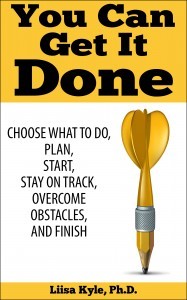 Check out my book YOU CAN GET IT DONE: Choose What to do, Plan, Start, Stay on Track, Overcome Obstacles, and Finish
Check out my book YOU CAN GET IT DONE: Choose What to do, Plan, Start, Stay on Track, Overcome Obstacles, and Finish
Available here in paperback or ebook format: http://bit.ly/YouCanGetItDone
***
If you’d like to share or publish this article, you may, if you include the author’s name, a link to this original post and the following text blurb:
Are you struggling with too many talents, skills, ideas? You may have The DaVinci Dilemma™! Find tools, fun quizzes, coaching, inspiration and solutions for multi-talented people at http://www.davincidilemma.com/.

September 2, 2017
Take an Information Vacation

image via commons.wikimedia.org
Are you an information addict? A news junkie? A Facebook frequenter, a Twitterer or devotee of other social media? A slave to your PDA or fancy phone? The costs of this information addiction are well documented. No wonder it’s becoming chic these days to ‘go off the grid’ for a period of time. There are many good reasons to take breaks from the electronic aspects of our lives. This is especially true for creative and multi-talented people (a.k.a. DaVincis).
Tim Ferriss, author of The Four Hour Work Week, advocates minimizing electronic assaults by taking an Information Vacation. No checking email. No web surfing. No Twittering or Facebooking or watching the news. No laptop activities of any kind. No PDA. No TV either. Worried about missing some important new story? You won’t. Hey, you even have an automatic conversation aid when talking with people: “I’ve been away from the internet — what’s going on in the world?”
Some groups have been practicing a regular, weekly ‘down time’ for millennia. An Orthodox friend told me how grateful she is for her religion’s practice of taking 24 hour ‘time outs’ once a week. It’s how she copes with this mad, electronic age. She doubts she could manage her work, parenting, community service and everything else she juggles without stopping each and every week to unplug and re-energize.
You don’t need to join a religious group to reap the same benefits.
Why Take an Information Vacation?
1. To relax.
If you’re a multi-talented person, you’ve got an awful lot going on. If you’re also battling information addiction, you’re putting yourself under even more stress. Your mind and body need some high quality relaxation. Once refreshed, you’ll be better able to tackle the many things on your creative plate.
2. To take a break from negativity.
A lot of news and current events are horrible and depressing. (If it bleeds — or grosses out — or titillates — or infuriates — it leads). You owe it to your many talents to take a break from all that. Particularly if you’re feeling blue or blah or otherwise out of sorts. An Information Vacation is an effective Rx for many mood ailments.
3. To refill your creative well.
Sure, you can get some ideas from the internet and television and your Facebook news feed. But once your creative cup is full, all the extra data is just sloshing over the rim, making a mess. By taking an Information Vacation, you can push aside all those outside voices and let your own creative ideas burble back up. When you’re unplugged, you can simply daydream and let your creative spirit play. Ah…isn’t that better?
4. To re-energize.
At the risk of repeating the point, creative people are susceptible to the nefarious forces of many electronic media. Information addiction saps our strength and drains us of creative energy. When we silence the media cacophony, we allow our minds, bodies and spirits to re-energize. If you’ve been feeling fatigued or exhausted with no real reason, try taking an Information Vacation. Odds are high, you’ll regain your former verve.
5. To reward yourself.
Many DaVincis are far too hard on themselves. They rarely reward themselves and they don’t indulge in nearly enough fun. Ideally, an Information Vacation can be a guilt-free treat for all the good works you’re doing. It’s a well-earned treat to do the unplugged things you love.
6. To reconnect with people (and pets).
Information addiction can isolate you from the world. The more time you spend online the less you’re spending interacting with your friends, family and community members. Socializing is a basic human need. An Information Vacation allows us to reconnect with the people (and animals) who give our life meaning.
7. To improve your health.
Reducing stress improves every bodily function. An easy, effective way to enhance your well-being is to remove yourself for the stream of stressors known as the information highway. Give your body a treat by unplugging, at least temporarily, from the electronic world.
How to Take an Information Vacation
Ideally for a whole day (or even for the whole weekend!) but if that’s out of the question, then at least pick one evening to unplug. No checking email. No web surfing. No Twittering or Facebooking or watching the news. No laptop activities of any kind. No PDA. No TV either. Take some time to do ANYTHING else. Read a book, have a nap, play a board game, listen to some music, make something, take a walk, meditate, try a yoga pose or two, make a nice meal & eat mindfully, catch up with your household members, go to a concert or play — the sky’s the limit.
Activity: List ten unplugged activities you enjoy
Activity: Select an evening or a full day (or two!) to unplug. Schedule it. Prevent/avoid anything that would break or disrupt your appointment. During your scheduled time, avoid your computer, TV, PDA — anything electronic. Instead, do any of the unplugged activities you enjoy.
***
 Check out my book YOU CAN GET IT DONE: Choose What to do, Plan, Start, Stay on Track, Overcome Obstacles, and Finish
Check out my book YOU CAN GET IT DONE: Choose What to do, Plan, Start, Stay on Track, Overcome Obstacles, and Finish
Available here in paperback and e-book format: http://bit.ly/YouCanGetItDone
***
Want to re-publish this article? Go for it – just include the author’s name, a link to this original
If you’d like to share or publish this article, you may, if you include the author’s name, a link to this original post and the following text blurb:
Are you struggling with too many talents, skills, ideas? You may have The DaVinci Dilemma™! Find tools, fun quizzes, coaching, inspiration and solutions for multi-talented people at http://www.davincidilemma.com/.

September 1, 2017
Information Addiction – The Costs
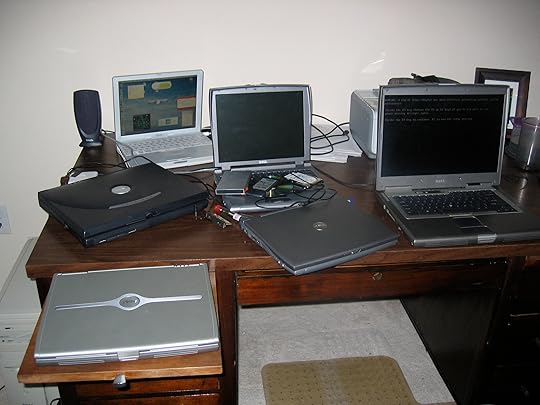
image via commons.wikimedia.org
Are you are an information-maniac, a news junkie, a social-media butterfly? If so, you might be hurting yourself more than you think. The costs of information addiction are many and profound. Alas, I know this not only from personal experience (“Hello, my name is Liisa and I’m an info-holic.”) but also from many of my coaching clients who share this malady. Let’s face it: multi-talented, creative people are, by definition, interested in many, many things. We appreciate ideas. It’s natural to want more. And more. But there’s a point after which, the pain outweighs the gain. If you have a tendency to surf the internet and social media outlets a bit too much, consider the following:
1. You’re being less creative.
Consuming information voraciously may well give you some creative ideas…but doing so also interferes with the time you could be spending actually creating. The more time you spend sopping up other people’s ideas, the less of your own you are generating, developing or executing.
2. You’re getting less done.
By definition, whatever time you’re spending surfing the ‘net, reading your Twitter/Facebook news feeds and/or attending to your fave RSS feeds, the less real work, the less real thinking you’re doing and the less real creating you’re doing.
3. You’re procrastinating.
If you tend to struggle with procrastination, tech-checking behaviors, tech-related addictions are sinkholes riddled with procrastination landmines. (“I’ll get started right after I check my email” becomes “What’s the latest Gawker post” followed by “I gots to check my FB news feed — check on my peeps!” or “I should really check the weather this weekend” and before you know it, it’s 3 pm and you’re still haven’t started.
4. You’re wasting time.
Consider this: if you checking your email 25 times a day versus twice a day, your email is still equally ‘checked’. It just took you 23 more actions…and that much more time. For maximum efficiency, author Tim Ferriss recommends batching tasks. For example, you can set up two regular times for checking your email — 9 am and 4 pm. Worried you’ll miss something urgent and important? Ferriss suggests using an Auto Responder message that tells people when you check your email and providing your phone number for emergencies. (For more tips on making better use of your time, click here).
5. You’re not focusing.
The more information you’re scanning, the less you’re focusing.
6. You’re re-wiring your brain. And not in a good way.
Research has proven that our brains create neural pathways reflective of our thought patterns. The more you jump around among different bits of information, the less focused you are, and the more likely that you are creating permanently distracted thinking pathways among your neurons. You’re basically training yourself to NOT concentrate on anything, ever again.
7. You may be shortchanging your relationships.
If you’re spending too much time online, you’re missing out on time with your friends, family members and even your pets. The great irony of the tsunami of ‘social media’ is that those who indulge are spending less and less time socially, in person, with other humans.
8. You are hurting your health.
The more sedentary we are, the less healthy our bodies and the more likely we are putting on excess weight. If you’re packing on the pounds, it might be time to step away from the keyboard and around the block. Walk the dog, ride a bike, go shopping, hit the gym…give your brain a break while you give some attention to your physical self.
*****
Reality Check:
Activity: How much of your day is spent monitoring electronic information? Write down an estimate.
Now: Actually measure and analyze your time use for a few days. Keep track of exactly how much time you are spending surfing news sites or participating in social media.
Any surprises?
*****
If you find you’re spending ‘too much’ time on electronic activities, consider the following strategies to reduce the costs of Information Addiction.
1. Batch electronic actions, like checking your email or social media feeds.
Restrain yourself to checking in at two set times per day max.
2. Time box internet surf sessions.
Set a timer for the maximum amount of time you want to spend surfing the net. Whatever info you glean is “enough”.
3. Replace some of your internet time with other activities.
Create. Play. Exercise. Meditate. Volunteer. Call a friend. Daydream. There’s a million ways to spend a given hour. What would make you happy?
4. Take an Information Vacation
Try going “off the grid” one or more evenings a week. Why not spend an electronic-free Saturday or Sunday?
*****
Activity: How does your Information Addiction manifest? What electronic activities are sopping up too much of your time?
Activity: What are these activities costing you? Consider the costs listed above…plus any others you’ve noticed.
Activity: Try one or more of the options to reduce your Information Addiction.
***
 Check out my book YOU CAN GET IT DONE: Choose What to do, Plan, Start, Stay on Track, Overcome Obstacles, and Finish
Check out my book YOU CAN GET IT DONE: Choose What to do, Plan, Start, Stay on Track, Overcome Obstacles, and Finish
Available here in paperback or e-book format

image via commons.wikimedia.org
: http://bit.ly/YouCanGetItDone
***
If you’d like to share or publish this article, you may, if you include the author’s name, a link to this original post and the following text blurb:
Are you struggling with too many talents, skills, ideas? You may have The Da Vinci Dilemma™! Find tools, fun quizzes, coaching, inspiration and solutions for multi-talented people at http://www.davincidilemma.com/.

August 10, 2017
How Balanced is Your Life?

image via commons.wikimedia.org
Balancing different aspects of life — work, play, family, friends and more — is difficult for many people. It’s significantly more challenging for DaVincis — creative people who are also juggling their many talents, projects and ideas. As we see in the vast majority of our coaching clients, Balance is a Top DaVinci Challenge for multi-talented people. This post is the first in a new series of articles devoted to helping DaVincis create, develop and maintain life balance.
Let’s begin by taking stock of your current situation.
Self-Assessment: How Balanced is your Life?
1. How satisfied are you with your life?
Let’s begin by creating a picture of your present life. Literally. First, make a list of the life domains that are important to you (e.g. health/fitness, homelife, social, career/professional, learning/education, spiritual, creative expression, travel/adventure/fun, community service, etc.) — this will be different for everyone so select and label the categories to suit your own unique circumstances. Once you’ve created your personalized list of Important Life Domains, rate your satisfaction with each on a scale of 0 – 10 (where ‘0’ means ‘completely dissatisfied’ and ’10’ means ‘extremely satisfied’.
Next, draw a circle. Divide the circle into equal segments, each representing your personalized list of Important Life Domains. It should look like a perfectly portioned pie. Now, draw a line from the middle of the circle to to the top. Divide the line into equal spaces, numbered 0 – 10. The center of the circle represents ‘0’ while the outer perimeter represents ’10’. Half way is ‘5’ and so on. Using this line as a guide, plot your satisfaction scores for each segment. For a clear image of your current life balance, draw a line to join the plot points. If it looks like a circle, your life is beautifully balanced. If it looks lopsided, some Important Life Domains are getting shortchanged. What’s happening in your circle? Which Important Life Domains need some attention?
2. How much time do you give yourself each day? Each week?
(This is meant to be a general, off-the-cuff estimate… however if you feel compelled to do a detailed analysis of your time use, here’s how).
The point is to be honest: Are you giving yourself short shrift? If so, you’re not alone: in coaching corporate executives and successful artists, it’s astonishing how many clients burst into tears when I asked them if they could give themselves twenty minutes a day. Here’s the thing: if you’re not attending to your own needs, you’re not being effective in meeting the needs of everyone else who depends on you.
3. How much time do you spend growing or nurturing your mind each day? Each week?
Your creativity springs from your vibrant imagination. If you’re not attending to your brain, you are curtailing your creativity. Ditto if you are engaging in behaviors known to harm your brain — like overindulging in alcohol.
4. How healthy are you? How much time do invest in maintaining or strengthening your body each day?
The goal is not to look like an airbrushed magazine cover. The goal is health. This is another fundamental ingredient in life balance. When you take good, basic care of your body, you create the energy to do everything else.
5. To what extent do you engage in your preferred spiritual practices?
Whatever the nature of your spiritual beliefs, it’s essential to incorporate the practices you find fulfilling and soothing. It doesn’t matter if it’s a weekly walk in nature or stopping once a day to meditate or observing particular rituals or simply taking a moment to express appreciation for the blessings in your life. To what extent are you finding time and space to nourish your spirit?
6. How well do you sleep? Do you experience any sleep disturbances?
Studies show that optimum sleep patterns for adults is seven hours a night. DaVincis often have so many thoughts pinging around their brains, they often find it tough to fall asleep. Sometimes they wake up in the middle of the night bursting with ideas. When creative people find their mood dipping down, it can trigger over-sleep and unusual difficulty waking up in the morning. Sometimes multi-talented people deprive themselves of sufficient sleep as a way of trying to gain more productive hours in the day. If this becomes a established pattern, it can have long-term consequences for your physical and mental health.
7. In what shape are your finances?
Are you managing your money effectively? How do you feel about money in general — Fear? Anger? Joy? Avoidance? What are your beliefs about wealth? About wealthy people? Financial concerns and beliefs are enormously important in developing a contented, creative life. How are you faring in this aspect of life?
8. How stressed are you?
On a scale of 0 – 10, how stressed are you on an average day? (Where zero means “I’m a human noodle, completely stress-free” and ten means “I’m shaking, frothing and my hair is about to combust”). Stress is inversely proportional to life balance.
9. To what extent are your ideas being heard and developed?
A key element of life balance is making meaningful contributions to each of your Important Life Domains. For each, ask to what extent your ideas are being heard and developed. You may find that your ideas are flourishing at work but that your thoughts at home are being squelched, silenced or otherwise curtailed. To what extent are you giving yourself the time and space to develop your creative ideas?
10. How well do you treat yourself? How do you reward yourself?
These are two different but equally important questions. How you treat yourself determines how others treat you. How you reward yourself (or don’t) affects your motivation and effectiveness.
*****
Activity: Clear some private, uninterrupted time to go through this self-assessment. Answer each of the 10 questions. In which respects are you balanced? In which are you not? Make a list of what’s working well and what isn’t.
*****
Check out my workbook: YOU CAN CHANGE YOUR LIFE: A Workbook to Become the Person You Want to Be. Available here: http://bit.ly/ChangeYourLifeWorkbook
*****
If you’d like to share or publish this article, you may, if you include the author’s name, a link to this original post and the following text blurb:
Are you struggling with too many talents, skills, ideas? You may have The DaVinci Dilemma™! Find tools, fun quizzes, coaching, inspiration and solutions for multi-talented people at http://www.davincidilemma.com/.

July 14, 2017
Coulda Woulda Shoulda – PART TWO: How to Overcome Coulda Woulda Shoulda Thinking

image via commons.wikimedia.org
Regrets often take the form of Coulda Woulda Shoulda thinking. Part One of this article described the costs of Coulda Woulda Shoulda. Today, we’ll continue by discussing proven ways to overcome this pattern.
1. Recognize that everyone has some regrets in life – and see how they handle them.
You are not alone. Look at how the people you know handle their regrets. Of those, who would you like to emulate? Uncle Biff who’s never ever gotten over that missed baseball in Little League – or Aunt Buffy who made and lost a million bucks and laughed her way through the process of making her subsequent million?
Look for inspiration in celebrities, too. Growing up, Mel Brooks studied drums with the drumming legend Buddy Rich. Rich thought young Mel was a prodigy and was grooming him to follow in his footsteps. When Mel heard the siren song of comedy writing, Rich warned him he was making the mistake of his life giving up a promising career in music to mess around telling a bunch of stupid jokes. Brooks says that although Rich never forgave him, he never regretted the path he took.
2. Apply a statute of limitations.
What is it that’s got you stuck in Coulda Woulda Shoulda thinking? Write it down. When did this event occur? (Wait, how many years ago?!) How much longer do you intend to brood over it? Do yourself a favor by placing a limit on how long you let yourself dwell on what happened (or what didn’t happen). (“Okay, I’ve felt badly about this for four years now. That’s plenty. Time to move on.”)
3. Do a reality check.
Most Coulda Woulda Shoulda thinking involves the implicit assumption that IF I would’ve done X (or not done Y), my life would now be much better, if not perfect. The fact is, however, that’s not necessarily so. If you would’ve done X (or not done Y), it’s not clear that you would have been successful. Odds are slim that every single thing would have unfolded perfectly. You don’t know what challenges or calamities may have befallen you along that untaken path.
Consider the notion that you made the very best decision and took the very best course of action available to you at the time, under those circumstances.
4. Appreciate your present circumstances.
Whatever’s going well for you now might not have been possible, had you taken that other path way back when. List five things that are in your life now — or experiences you’ve had that you value – that you would NOT have if your Coulda Woulda Shoulda situation had turned out differently. For example, a colleague was talking to me about a ‘golden opportunity’ she had — but didn’t take — to become a TV writer when she was 24. She had been thinking of it as a regret…until she realized that had she taken that path, she wouldn’t have had her ten year corporate career, the experience of living in Europe for a decade, her current wonderful marriage and a host of other elements that make her a better writer and a better person today.
5. What lesson(s) can be learned?
Think about your Coulda Woulda Shoulda experience. What happened? What might you do differently in the same circumstances? If you could go back in time and coach yourself through whatever happened, what advice would you give yourself? In what ways have you repeated your Coulda Woulda Shoulda experience? For example, did fear stop you? In what way are you still doing this today? Does your Coulda Woulda Shoulda represent an obstacle with which you’re still grappling? What alternative solutions are there?
6. Revisit your dreams.
If you’re still brooding over something, odds are it involved an important dream – one that probably got deferred. Ask yourself: is this still a dream or goal to which you aspire? If so, how can you take steps towards achieving that dream, starting now? If the dream is less attractive to you now, then give yourself permission to stop mourning what didn’t happen. It could well be that you didn’t REALLY want what you thought you did. For example, it could be that your earlier goal was something you (or someone close to you) believed you ‘Should’ do, rather than a true passion. For example, maybe you didn’t get into Medical School…and maybe that’s a good thing. The blood and gore and educational costs and long hours and lawsuits just aren’t that appealing. Perhaps you didn’t get that movie role and now you’re grateful you have the privacy that you would have lost and that you now cherish, working behind the scenes.
Or it could be that you weren’t (and aren’t) willing to put in the effort required to make your dream come true. Maybe it’s more of a it’s more of a fantasy than a life goal. (Sure, I’d love to be a size zero…but I’m not prepared to undertake the chronic starvation, oppressive exercise schedule and probably surgery required to achieve that particular physique.)
*****
Activity:
Write down your Coulda Woulda Shoulda experience.
How long ago did it occur?
Have you brooded over it long enough?
What lessons can you learn from what happened then? If you could got back in time and coach yourself through what happened, what advice would you give yourself?
Ask others for advice. Present the situation as an anonymous hypothetical. Ask what they would do under those circumstances. Odds are, they may come up with new ideas, suggestions or perspectives.
List five things that are in your life now — or experiences you’ve had that you value – that you would NOT have if your Coulda Woulda Shoulda situation had turned out differently.
Is this still a dream or goal to which you aspire? If so, how can you take steps towards achieving that dream, starting now? If the dream is less attractive to you now, then give yourself permission to stop mourning what didn’t happen.
*****
For more, check out my book “GET OVER It: Overcome Regret, Disappointment and Past Mistakes”. Available here: http://bit.ly/GetOverItNow
*****
If you’d like to share or publish this article, you may, if you include the author’s name, a link to this original post and the following text blurb:
Are you struggling with too many talents, skills, ideas? You may have The Da Vinci Dilemma™! Find tools, fun quizzes, coaching, inspiration and solutions for multi-talented people at http://www.davincidilemma.com/

June 7, 2017
Coulda Woulda Shoulda – PART ONE: Costs & Benefits

image via commons.wikimedia.org
Everyone has some regrets in life. What differs is how people deal with them. When you regret something you did – or didn’t do – in the past, do you engage in wistful Coulda Woulda Shoulda thinking? Do you fret about how things might have turned out differently “if only” you would have taken a different course of action? If so, you’re hurting yourself.
I’m not talking about things you’ve done for which you need to apologize and make amends. If there’s something you can do to address what happened in the past, by all means do so. Instead, today’s topic refers to those decisions or actions you’ve made in the past about which you can do nothing to ‘fix’ the situation.
There are two main types of Coulda Woulda Shoulda situations – those involving things you did (decisions you made, actions you took, opportunities you attempted, your perceived ‘mistakes’, etc. – “if only I wouldn’t have done X…”) and those you didn’t do (missed opportunities, paths you didn’t follow, things you didn’t say when you had the chance, and so forth – “if only I would have done Y…”). No matter what has occurred in the past, any Coulda Woulda Shoulda thinking about it takes a hefty toll on you and those around you.
Costs of Coulda Woulda Shoulda
1. Wasted time, energy, emotion & attention.
You can’t change the past so anything you spend dwelling on it is squandered. Period.
2. Creates a “victim” or “blame” mentality.
Whether you are blaming yourself or others, you’re fostering a ‘victim’ mentality that is unpleasant and often painful.
3. Devalues all that you have now.
The more you’re focused on the past, the more you’re missing the present…and the opportunities to improve things now.
4. Makes you more negative.
The more you beat yourself up for what you did or didn’t do in the past, the more you kvetch about what might have been, the more negative you’re being in the here and now.
5. Hurts your relationships.
Do you enjoy listening to others bemoan the past? No one else does either. The more you express ‘Coulda Woulda Shoulda’ to others, the less delighted they are. It’s especially frustrating for people who care about you – they are helpless to make you feel better. The more you dwell on things no one can change, the worse they feel.
Yet a lot of creative people engage in Coulda Woulda Shoulda thinking…so they must be getting some apparent benefits from it…
Apparent Benefits of Coulda Woulda Shoulda
1. It’s easy.
Coulda Woulda Shoulda means you are reliving the past, over and over – which is much easier than (a) trying to learn from what happened or (b) trying new approaches to those situations.
2. Saves you from taking risks (or any actions) today.
“Oh sure I *could* submit that article/reel/painting/proposal to X…but it didn’t work out last time I tried, so what’s the point of trying again?” Coulda Woulda Shoulda thinking is a false justification for succumbing to fear or pessimism or laziness. It can paralyze your actions, squash your creativity and stifle your progress.
3. Protects you from further harm or disappointments.
The helpful part of your psyche uses Coulda Woulda Shoulda thinking to spare you repeating past painful experiences…yet by interfering with your current activities it is disrupting your present success and happiness.
4. Self-punishment
Do you believe that if you make yourself feel bad enough about what happened for long enough, that you will be absolved somehow? It’s true that only you can forgive yourself. And that you need to forgive yourself to move on. You can do so now…or you can do so after twenty years of Coulda Would Shoulda self-flagellation. The only difference will be twenty years of feeling miserable…unnecessarily.
5. Backhanded way of bragging about your abilities, while never (again) putting them to test.
“I coulda been a contendah!” “I was rejected by Spielberg!” “The Random House editor loved my book but the bean-counters on the editorial committee nixed the offer.” This lets you and others see that you have been very, very close to greatness…once upon a time.
*****
Coulda Woulda Shoulda thinking can be very damaging to creative people. We’ll discuss ways to overcome it in Part Two of this article.
*****
Activity:
What causes you Coulda Woulda Shoulda thinking? What regrets have you been holding onto for a long time?
What does Coulda Woulda Shoulda cost you?
What apparent benefits do you get from Coulda Woulda Shoulda thinking? What are their hidden costs?
Turn to Part 2 of this article to review Ways to Overcome Coulda Woulda Shoulda.
Check out my book “GET OVER It: Overcome Regret, Disappointment and Past Mistakes”. Available here: http://bit.ly/GetOverItNow
*****
What about you? What costs and apparent benefits have you experienced in Coulda Woulda Shoulda thinking? Please tell us about your experiences in the comment box below.
*****
If you’d like to share or publish this article, you may, if you include the author’s name, a link to this original post and the following text blurb:
Are you struggling with too many talents, skills, ideas? You may have The Da Vinci Dilemma™! Find tools, fun quizzes, coaching, inspiration and solutions for multi-talented people at http://www.davincidilemma.com/.


